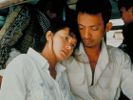Eye For Film >> Movies >> One Evening After The War (1998) Film Review
Note: To explore some of the issues, this review will contain spoilers after the paragraph that starts, “Sroey is a bar girl.” Up to the end of that paragraph, there are no spoilers.
Have you ever felt that something was so out of reach, that even a taste of it would be the most magical thing that could possibly happen? Maybe you’ve loved and lost. Tried for a better job which didn’t work out. Hoped for a miracle cure for life’s ills, but knew deep inside the pill was no more than an aspirin?

Perhaps not. Perhaps your glass is always half full. It’s all a state of mind. Being ‘content’ with one's lot. Either way, I hope this film will move you.
In One Evening After The War, Sroey recalls her life with Savannah, a young man who recently served with the army. It is not the happiest of tales. Yet for Sroey, it gave her a lasting vision of something wonderful. Something she reached for and yearned for. And even if it didn’t happen the way it should, it is still the stuff movies are made of.
The first thing we are told is that Savannah came to Phnom Penh in August 1992. This is highly significant, but assumes the viewer is familiar with the history of Cambodia, which excludes many Westerners. Savannah has spent four years fighting the Khmer Rouge. Now he rides south on a train know as the ‘death wagon.’ So called as it is used by those ‘with nothing left to lose.’ Starving peasants. Soldiers with nothing. And should a landmine explode...
Savannah lost his whole family to the war, except for an uncle in Phnom Penh. Of his colleagues, Maly and Phal, one has lost just a leg. Savannah is intact but broke. He can maybe kick-box for a living. From his childhood on, Savannah has only known war.
Sroey is a bar girl. For lovers of Cambodian culture, there is a quaint scene of nightclub dancing where men and women dance with each other from side to side, pretending to touch. Cambodian society is quite prudish, and the dance is based loosely on a classical dance piece where men and women bang empty coconut shells to the beat - and (flirtatiously) to each others’ shells. But Sroey has a reputation for only spending time with well-heeled men. (The United Nations arrived en masse in Phnom Penh in 1992 with large numbers of NGOs. They had expensive cars and paid high prices for daily needs, quickly creating a society of haves and have-nots.)
Savannah’s initial advances are rejected. He is persistent, and one scene is suggestive of date rape. In an American film, we would probably say, how ridiculous! She falls in love with the guy who rapes her? But what can be regarded as misogynist-fantasy in Band Of Angels (1957), or even True Blood (2008), here simply proves to be grounds for deeper (and very unsettling) thought; it questions the whole diatribe against the unrealistic plot device of giving the victim an arousing experience without soiling her innocence. Savannah only uses what seems to him a ‘culturally acceptable’ degree of force. Sroey is probably then asking herself, is it better to be raped by someone who loves her and wants to be ‘good’ to her, or a succession of wealthy men who don’t care an iota? Savannah loves her but can hardly support himself, so his berating her to leave her life of prostitution (which also helps support Sroey’s family) sounds hollow to her ears. After raining love on him, she tells him he’s wasting his time: “When you sell your body, you’re already dead.”
They strain to find a momentary Elysium, but the bar owners bring a fantasy-shattering reality check.
When we lose in love, the isolation can reveal our true character. Are we tempted by our lower tendencies, do we give up in despair, or can we somehow find the fortitude to carry on? An Evening After The War is a love story by Cambodian’s greatest film director, shot in visually beautiful neo-realist style. It offers rare insights into Cambodian culture – from the houses on stilts to the strange rituals of Cambodian boxing. It is a challenging love story. It is invaluable for scholars of the complex period of history to which it pertains. And without ramming it down our throats, it is a commentary on the political plight of Cambodia and one of its biggest problems – young women forced into prostitution.
The expensive United Nations mission - to establish democratic elections there - failed. Three months after the vote, Khmer Rouge veterans simply muscled in with a ‘coalition’. Cambodia is near the bottom of the international Transparency Index (which measures government corruption). Yet its people treasure fragile peace without bitterness. It is this that injects a note of conscious irony into the title of the film. The fragile peace that our heroine attains, in even a temporary way, becomes a touching symbol of the small but valuable achievement of her people.
Sroey was just 19 years old. The poignancy of her story is emotionally shattering.
Reviewed on: 31 Mar 2010
















